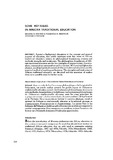| dc.contributor.author | Adeyemi, M.B. | |
| dc.date.accessioned | 2013-09-25T09:26:17Z | |
| dc.date.available | 2013-09-25T09:26:17Z | |
| dc.date.issued | 2002 | |
| dc.identifier.citation | Adeyemi, M.B. & Adeyinka, A.A. (2002) Some key issues in African traditional education. McGill Journal of Education, Vol. 37, No. 2, pp. 223-240 | en_US |
| dc.identifier.issn | 1916-0666 | |
| dc.identifier.uri | http://hdl.handle.net/10311/1169 | |
| dc.description.abstract | Against a background discussion of the concept and general purpose of education, this article examines some key issues in African traditional education, namely its philosophical foundations, content and methods, strengths and weaknesses. The philosophical foundations of African traditional education are the five principles of preparationism, functionalism, communalism, perennialism and holisticism. We have highlighted the physical, social and spiritual content of African traditional education and the practical method of teaching and learning. The strengths and weaknesses of African traditional education are discussed and the attention of readers directed to possible areas for further study. | en_US |
| dc.language.iso | en | en_US |
| dc.publisher | McGill University, Faculty of Education, http://www.mcgill.ca/education/ | en_US |
| dc.subject | African Traditional Education | en_US |
| dc.subject | Traditional Education | en_US |
| dc.subject | Education | en_US |
| dc.subject | Indigenous education | en_US |
| dc.subject | Communalism | en_US |
| dc.subject | Functionalism | en_US |
| dc.subject | Preparationalism | en_US |
| dc.subject | Perennialism | en_US |
| dc.subject | Hosticism | en_US |
| dc.title | Some key issues in African traditional education | en_US |
| dc.type | Published Article | en_US |
| dc.link | http://mje.mcgill.ca/article/download/8622/6565 | en_US |

